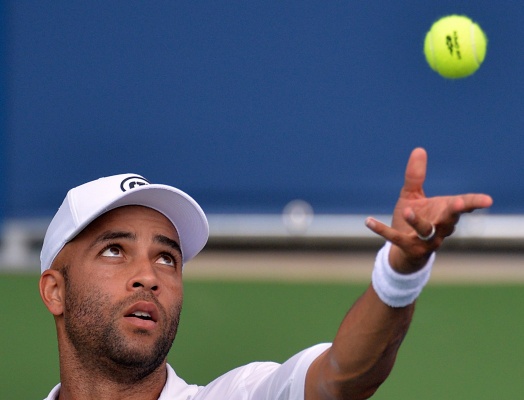Patrick Lynch, What Do You Stand for?
MCT
James Blake serves an ace against John Isner during the quarterfinals of the BB&T Atlanta Open at Atlantic Station in Atlanta, Georgia, on Friday, July 26, 2013. Recently, due a viral video of James Blake and a police officer, conversation about police brutality has been more widely discussed. (HYOSUB SHIN/ATLANTA JOURNAL-CONSTITUTION via TNS)
October 19, 2015
I am one of many indignant Americans who watched the viral video of Officer James Frascatore slamming James Blake, a former American tennis player, to the ground outside his Midtown hotel room earlier this month. Immediately after the incident, Mayor Bill de Blasio and Commissioner William Bratton apologized to Blake for the ordeal, and promised justice in the form of a full investigation. Subsequent investigation revealed that this was not Officer Frascatore’s first incident involving alleged excessive force, and various news outlets as well as notable figures, including Laurie Cobb and Andy King, have called for the officer’s dismissal from the force. Finally, and most shockingly of all, on Sept. 15th, you published an open letter publicly defending Office Frascatore’s actions and claimed that “[the public] is not qualified to judge the actions of police officers.” I found the letter despicable, classless and an insult to all officers who do take pride in their jobs and do them right.
As human beings, we have basic rights, most notably the right to be treated with professionalism and respect. A police officer is only effective so long as he recognizes and respects these basic rights; the video content and Officer Frascatore’s past history of excessive force strongly suggest that he is unfit to perform the duties of a police officer. These thoughts are not “uninformed conclusions,” but rather the justified anger and concern from an informed citizen. The video that you accused “pundits and editorial writers” of sensationalizing and using to wrongfully jump to conclusions may be short and devoid of sound, but the footage it contains sends a powerful message. At the time of the alleged wrongful arrest, Blake was forcefully dragged to the ground despite the fact that he posed no threat to either the officer or the public’s safety. The fact that you would risk the reputation of the countless New York Police Department officers who go to extreme lengths to carry out their work with both integrity and pride for one officer who has demonstrated a clear disregard for the police code of conduct is both extremely shocking and, in certain aspects, revealing of the standards, morals and motives of your organization. There is also a certain level of irony in your calling those who reported and publicized the incident “un-American.” The reporters are exercising their right to expression and free speech, fundamental concepts to the identity of the United States. The only “un-American” aspects of this incident are Officer Frascatore’s actions that day, as well as your continued insistence to stand by and uphold his actions.
You are absolutely correct in the sense that a normal citizen could never fathom the difficulty and pressures associated with being a police officer. It is an extremely difficult job, and I am personally most appreciative of the efforts of every police officer past, present and future. Such a job requires substantial emotional, mental, physical and even financial support, and the Patrolmen’s Benevolent Association has been instrumental in providing those services. It has led the fight for increased NYPD officer wages and benefits, and the planning and continued implementation of the Widows’ and Children’s Fund. But while the PBA regularly commends exemplary police work and heroics, it also has the obligation to call out the officers who are not upholding the values and standards of the department. The concepts of supporting the police while condemning their wrongful actions are not mutually exclusive. Furthermore, the public has every right to judge the actions of police officers; it is, after all, the public to whom police officers are supposed to protect and serve. As a civilian force in a democracy that has sworn to protect New Yorkers, we are all qualified to judge you, and we expect a few things from police officers, to quote a New York Times editorial: “To not violate the Constitution and to not kill unarmed people” not as wannabe Rambos.
In closing, Mr. Lynch, as a representative of all the police officers who walk and protect the streets of New York City, you should not and cannot continue defending the wrongful actions of a small group of officers who have decided that holding a badge gives them immunity from the laws and regulations instituted to protect the general public. Doing anything less would be a grave injustice to those who devote their time and lives to protecting our great city.












